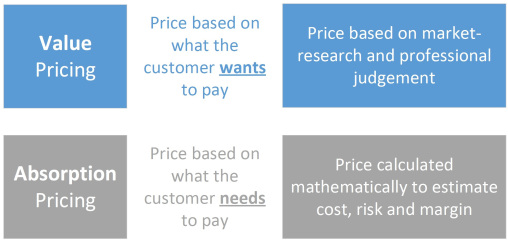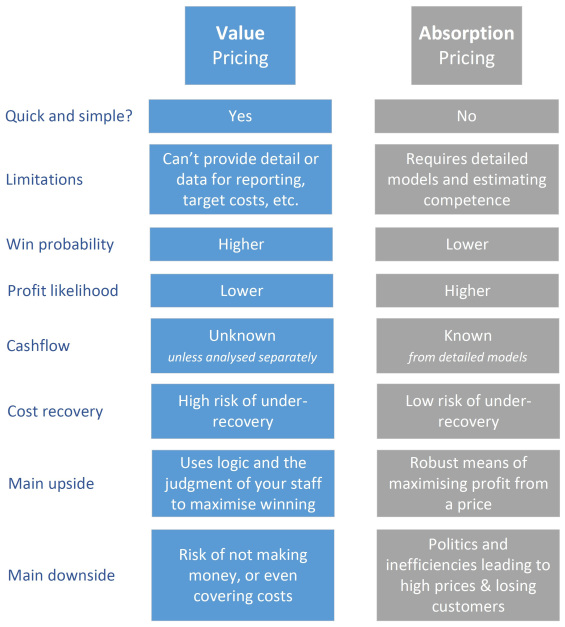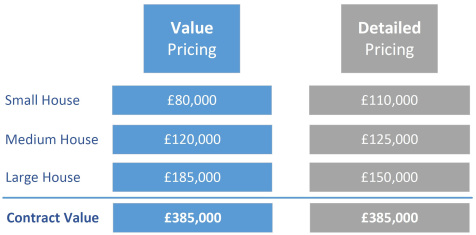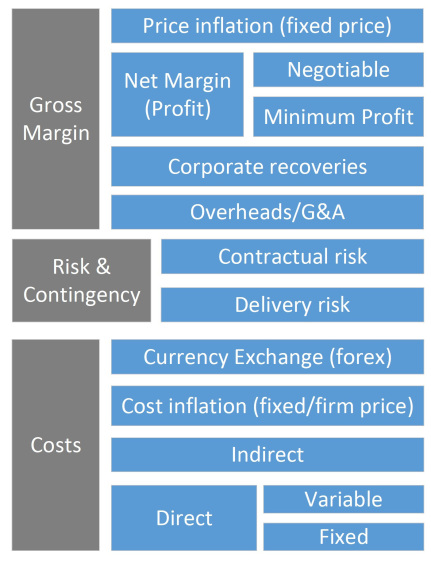Bidding Quarterly Launched – Download Issue 1 Now
Issue 1 of Bidding Quarterly declares ‘hope is not a strategy’ and provides insight, opinion & straight-talking from Bid Solutions’ panel of industry experts.
Click here to download your copy of Bidding Quarterly
To view our latest vacancies for bid and proposal professionals, follow this link. To help us connect you with a winner to add to your team, follow this link.
Crafting & Conveying Value
Wondering How to Develop Value Propositions?
There’s very little clear guidance or tools available to help bid teams to develop value propositions. Bearing in mind that research suggests that only 14% of a seller’s unique benefits are actually seen as such by buyers, our partner Strategic Proposals decided to embark on some research to delve deeper in to value. Their aim was to try and help organisations to answer the ‘So What’ question better. This paper, written by Jon Williams and Graham Ablett is the result. It’s a fascinating read and explores all the different ways that a buyer looks at value and provides you with thoughts and ideas to help ensure you build these into your proposals and presentations.
Click here to view the full report.
To view our latest vacancies for bid and proposal professionals, follow this link. To help us connect you with a winner to add to your team, follow this link.
Massive congratulations to WSP ׀ Parsons Brinckerhoff, winners of the 2016 UK APMP People Development award, sponsored by Bid Solutions. Read how they did it…
Winners of the 2017 APMP People Development Award
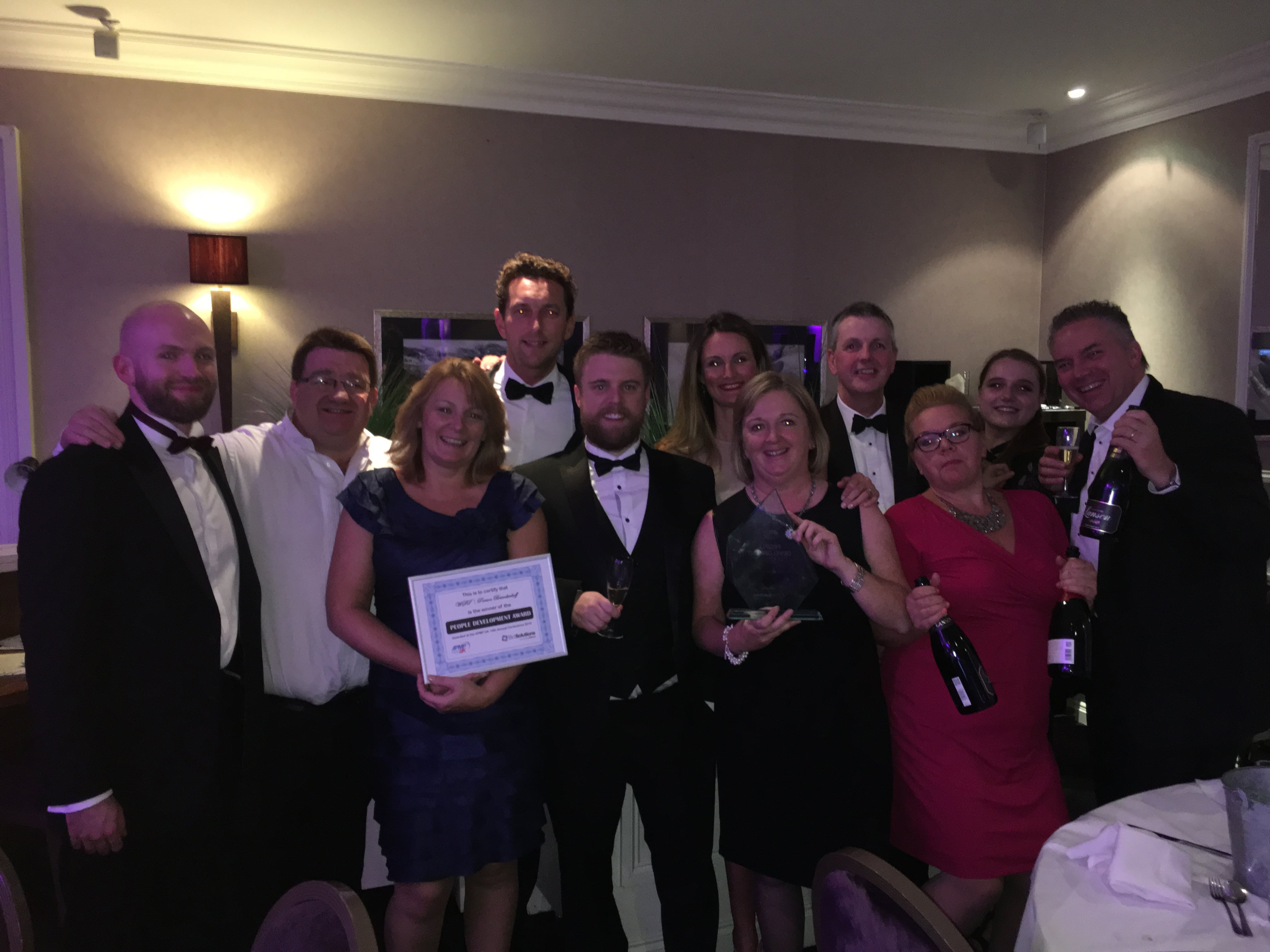
In 2014 WSP acquired Parsons Brinckerhoff and its UK proposals team doubled in size. Their challenge was to integrate people who worked to different processes, procedures and practice.
The management team recognised the need to define a common language for business and invest in its people to improve skills. A dual purpose programme was designed to integrate teams whilst improving proposal quality.
Step 1: Best Practice Training
A leading training provider worked with them to develop a course based on APMP theory. Six successful months of training followed: four UK locations, 50 newly-integrated staff and an average feedback score of 96%.
Step 2: A Competition to Promote Ongoing Best Practice
The impact on bid quality was immediate and showed in bid reviews, but sustaining this required a continued focus and application of best practice.
With a brief to showcase new skills and an incentive of £250, the ‘2016 Best Practice Competition’ was launched. This was the opportunity to apply and showcase the valuable techniques learned during the training.
Step 3: Integration of Process & Governance
To further support people in making good business decisions, they reviewed process and governance. They took the best from both legacy organisations and introduced improvements that reflected APMP best practice.
The Outcome: A Refreshed Perception
The combined team’s ability to qualify with rationality, influence the impact of a document and develop content has resulted in a renewed respect from technical teams for a professional proposal function.
The Evidence
APMP accreditation has been the backbone of this upskilling initiative and their objective is for all proposals staff, including new starters, to achieve Foundation level.
- From 18 to 41 people CF APMP in 12 months
- 13 people progressing to Practitioner, four achieved this during 2016
- Attendance at eight Foundation courses
- Hosted two APMP events
- Inclusion of APMP Practitioner accreditation in a financial incentive scheme to reward professional achievement
Overall win rate increase – increase in win rate of 39% in 12 months.
Their best score yet – 100/100 for quality recently recorded on a bid (combined quality/financial score of 99.55/100).
And here is some of the feedback received…
“The final decision was made in the board room. Your competitors were the recommended consultant. Based on the compelling document and your evident thirst for this project, we selected WSP | Parsons Brinckerhoff over them.” Skanska
“If you asked me yesterday to write an introduction to why I’m a relevant Project Manager, it would be very different to the one I’ll write tomorrow. Tomorrow, it will be relevant and benefit rich!” Andy Poole, Following 5 Ways to Improve training
“The submission is extremely compelling.” Darrell Wilson, BDP
The feedback speaks for itself. The focus on people development has empowered WSP Parsons Brinckerhoff to produce powerful proposals, inspired careers and shaped an expert team to deliver the vision to BID LESS, WIN MORE.
I think you will agree with me when I say very worthy and impressive winners. Congratulations from all the team at Bid Solutions!
To view our latest vacancies for bid and proposal professionals, follow this link. To help us connect you with a winner to add to your team, follow this link.
‘Ask the Expert’ Launched – Free, Impartial Advice from Recognised Industry Professionals
Bid Solutions is delighted to announce the launch of its ‘Ask the Expert’ service. Advice from some of the leading lights in the industry, to help you with problems and build your own bid library.
With so many different approaches to bidding and a growing recognition of our profession globally, we understand just how hard it can be to get an objective opinion on best practice or industry-specific challenges. Having personally worked with some of the best people in our profession for over 20 years (and having benefitted from their counsel on many occasions), I’m pleased that we can now extend this fantastic service to our wider network.
The panel is comprised of 15 experts and is actively expanding to cover more industries and disciplines. Our current range of expertise includes: Apprenticeship Programmes; Benchmarking; Cost Modelling & Pricing Deal Management; Public Sector Bidding; Leadership & Coaching; Innovation; Proposal Management; Business Transformation; Proposal Training; Organisational Design; Professional Development; Content & Knowledge Management; and Microsoft Word.
The industries currently covered include: Construction; Professional Services; Financial Services; Aerospace; IT; Defence; and Telecoms.
Got a burning questions or struggling with a particular challenge? Simply find the relevant expert and submit your question at https://bidsolutions.co.uk/bid-hub/ask-the-expert/
Our experts have already offered up some fantastic advice and you can benefit by following the links below:
· Bid Consultancy Advice
· Automated Bid Tracking Software
· Incorporating original thinking in tender responses
· Direct award options for unique services
· Team motivation and engagement in times of change
· Post Brexit Procurement Regime
· APMP Training
As recognised thought leaders, our experts will be regularly sharing new ideas on best practice and discussing industry trends. Follow all their updates on our website and LinkedIn feeds.
More Information for your Bid Library
More resources are available to you, free of charge, through our Bid Hub.
How often do you achieve a win / win deal?
It was a compelling evening with the International Proposals Academy in London on Monday evening. Ian Law, Head of Commercial Support at Deloitte, led the session on how to secure a win / win deal. Drawing upon his experience of 8 years as Head of Procurement at Barclays, Ian gave great insight into typical bidding pitfalls and guidance on how to create compelling proposals that truly resonate with their audience.
With experience of both sides of the table, Ian provided thought-provoking insight into how to get the most out of commercial negotiations.
We want to hear from you – how much planning do you put into negotiations? Do you try and achieve win / win deals or simply the best for your organisation?
For more expert advice and insight into how to write a winning bid, check out our Ask the Expert section.
Construction, Infrastructure and Rail News
This week’s Infrastructure, Rail and Construction Bid News:
Viridis Real Estate have awarded a £40.8m design and build contract to McLaren Construction. The contract will see McLaren redevelop the former offices of The Guardian newspaper on Farringdon Road, London into 9,300m2 of office and retail space. The project is due for completion at the end of 2018.
The Peel Group have secured planning permission for the second phase of the MediaCityUK development. The £1bn project will see the estate double in size, providing more than 1,400 new homes and 50,000m2 of office space. The plans include –
- Northern Edge – a new gateway to MediaCityUK including 3 buildings with 632 apartments, 6 two-storey live / work units, office space, 3 multi-storey car parks and more.
- The Arcade – retail / leisure space around a pedestrian arcade with office space.
- Studio Square – offices and a small park.
- Georgian Square – a public courtyard, six-storey podium on top of which would be 2 blocks of flats with residents terraces, 18 three-storey live / work units and separate commercial office space.
- Market Square – a village hall and square for markets and events.
- London Square – 14 three-storey town houses with 460 apartments on the upper floors and gym, cinema room and shared office space.
Carillion will continue their long running relationship with Centrica to deliver facilities management and project services in a new 5 year contract. Carillion will provide hard and soft FM services including security, cleaning, catering and planned and reactive maintenance in 115 Centrica locations across the UK and ROI. The new contract is worth £90m and has the potential to be extended to 7 years.
Department for Transport have issued an Invitation to Tender for the West Midlands rail franchise. The competition is between West Midlands Trains, owned by Abellio (with minority partners East Japan Railway Company and Citsui & Co Ltd) and the current provider, London Midland owned by Govia. The ITT sets out several improvements including
- An increase in Sunday services
- Bespoke local branding of trains forming part of a separate business unit managed by West Midlands Rail
- Space for over 30k additional journeys into Birmingham during peak times
- Increased frequency of some services and a new service from Birmingham and Wolverhampton to Crewe via Stafford and Stoke-on-Trent
- Expanding smart ticketing and providing free Wi-Fi on all local services by 2019.
To view our latest vacancies for bid and proposal professionals, follow this link. To help us connect you with a winner to add to your team, follow this link.
Research findings – “Gender in Work Winning”
This week saw the publication of startling new research into gender disparities in the bid / proposal profession. The study, led by Krista Takkala of Strategic Proposals and supported by Bid Solutions and the APMP UK, makes for some very challenging reading.
Although the data is primarily UK-based, respondents elsewhere suggested that there are concerns to be addressed worldwide.
Salary Survey Reveals Gender Pay Gap
Following the salary surveys published by Bid Solutions, it should come as no surprise to the profession that there is a gender pay gap. What does shock however is the scale of the problem; fundamentally affecting women and their career advancement. It clearly isn’t just affecting salaries, the research suggests there is widespread discrimination across all roles and all industries.
The report offers some excellent ideas and suggestions for tackling these problems head-on and is available to download here.
I know Krista would welcome further suggestions as to how to tackle the important issues raised. The full results and findings will also be debated at this year’s APMP UK conference in October. Full details of the conference can be found here.
To view our latest vacancies for bid and proposal professionals, follow this link. To help us connect you with a winner to add to your team, follow this link.
Construction, Infrastructure & Rail News
This week’s Infrastructure, Rail, and Construction bid news:
Perth & Kinross Council have awarded Balfour Beatty a £35m contract to deliver the first of four phases to the Perth Transport Futures Project. The project aims to ease congestion, improve accessibility and promote economic development. Balfour Beatty will build a newly separated junction on the A9 dual carriageway and a new link road creating access to development land to the west of the city. Works are due to start in September with completion expected in early 2019.
The Alstom Transport (UK), TSO and Costain joint venture has been awarded a £26m contract to build an infrastructure maintenance depot at Plumstead. The depot is scheduled to be operational in August 2018 and was the last of 100 major contracts for the railway to be awarded.
Kier has won a £48m contract to add office space and 2 multi-storey car parks to the ARM campus at Peterhouse Technology Park, Cambridge. The project will see an additional 18,000 m2 of office space, allowing ARM to increase their Cambridge headcount to 3,000.
East Ayrshire Council is seeking a main contractor to build a new Learning and Enterprise campus in the planned development of Knockroon. The project value is estimated at £50m will include the merge of 2 primary schools, further education and business enterprise facilities. Work is currently planned to start in April 2017 for completion by July 2019. Interested contractors can register their interest until 26th September.
To view our latest vacancies for bid and proposal professionals, follow this link. To help us connect you with a winner to add to your team, follow this link.
Value vs Absorption – how to price?
Value vs Absorption, a great article written by one of our experts, Peter Bryans.
There are so many pricing theories, strategies, approaches and so on throughout textbooks and the internet. To distil what is simple from what can be overly convoluted and complex – there are only two ways to set a price:
- Value Pricing; or
- Absorption Pricing
Value pricing is linked to the principles of what your customers are prepared to pay, Absorption is linked to the principles of mathematics on recovering the costs to meet your customer’s demand whilst making a profit.
Quite simply value pricing is predicated on what the customer wants to pay (or is believed to want to pay) whilst absorption is what the customer needs to pay so that costs are recovered and the supplier makes money.
Excluding luxury goods, does your customer ever want to pay more than you need them to?
To secure a sale, value pricing will be preferred on the viewpoint that work can only be won if the competition is beaten. On this basis, the price ‘is what it is’ and it is for the business to reverse-engineer profit, risk mitigation, cost recovery and a solution to fit within the set-price. The problem comes when price is too low for a business to work within or if milestone payments govern when and how much is paid; this can lead to problems with cashflow if you are spending money, to service a customer, at a rate greater than you are being paid over time.
To maximise the chances of being able to deliver to time, cost and quality and to yield a profit from a customer Absorption pricing will be preferred. The main problem can be that the calculated price is well above the competition.
Pro’s and Con’s
There are a variety of upsides and downsides to adopting value or absorption pricing:
If a company is small with a low cost-base that is easy to comprehend and manage then value pricing is all that is needed and, indeed, recommended. That said, cash flow should always be considered in parallel.
If a company is larger or has a cost-base that is complex and needs active management then absorption pricing is the sensible approach – provided costs and prices are moderated and scrutinised before being issued to customers.
Value Pricing – in more detail
Value pricing is named on the basis of the value perceived by the customer. We have all been customers and have our own perception of value, therefore the price we are prepared to pay before we’re told what it is – for a product or professional service. If we regularly go to the cinema, we ‘value’ it at £7.50 – £12 a ticket. If we go to a very nice and posh cinema we may increase that value perception to £20. If we went to a brand new cinema and they asked for £475 per ticket – would we accept it, graciously? Maybe we would if we had money to spare and it happened to be the world’s first fully immersive 4D experience. Realistically, we won’t accept such a high price – we would simply leave, go to another cinema, tell our friends and family and never return.
The art with value pricing, therefore, is to understand the market and to set a price that is commensurate with the customer’s perception of value.
Value pricing is orchestrated for new products or services in one of two ways:
- From first principles; or
- Following a critical review of detailed (perhaps absorption) cost and price calculation
First principles are consumer analysis, market research, professional judgment, and historical trends of current similar products/services. Simply speaking with and asking your customer about their value-view is advisable. By analysing a number of opinions and data sources a logical value price can be set.
When a detailed cost and price has been calculated a value price can be adopted as an over-ride. In other words, a total price can be broken down into sub-components and sold at discrete value-prices, to make up the same overall total. As an example, imagine a customer wanting three houses to be built on the same site; one small, one medium and one large. The prices in order to recover costs may not align to a value-view, but can be over-ridden to align and secure the work:
The detailed cost and price is such that there isn’t much difference between small, medium and large as the marginal costs between each is small. However, a value-view would have a much greater difference between the sizes.
If the detailed cost and price approach were to be put forward then the customer would not accept the offer and go elsewhere. This is because the small house would be seen as too expensive. If, however, the value-presentation were put forward then the work would be awarded. The contract values are the same either way. The downside here is that cash flow may be negative for a period and therefore you would hold an additional cost of capital for a duration. This could be added to the price, however.
Client budgets can be problematic in that although the customer may agree that the value of a product or service is above the available budget they simply can’t afford what is on offer. In these scenarios, companies need to think hard about whether they will continue to try to sell to the customer or innovate to supply something of lesser value at a lower cost, provided the customer’s requirements are still met.
If Value pricing is to be adopted and it is expected to lead to low or insufficient levels of cost recovery then a business decision needs to be made as to how the company can lower costs to deliver and make money.
Absorption Pricing – in more detail
Absorption pricing is found more in large organisations bidding for high cost /high-risk work and to tight contractual rules such as firm fixed price (a price that is quoted and does not change for long periods of time, sometimes ten years or more) and engineering & construction contracts such as NEC3 Options A to E.
Subject to whether the customer takes the risk of cost inflation, foreign exchange or delivery risk and what binding contracts may say about punitive charges for late or sub-quality delivery (eg: liquidated damages, service credits, bonds/bank guarantees, etc.) an absorption price model will consist of some or all of the items shown below:
A price is modelled / calculated to absorb all the various elements of cost, risk, and gross margin and is a function of how accurate each component part has been monetised. Each component will be influenced by the quality level of the underlying solution (product, service or project plan) and will change as the solution changes. For absorption pricing professional services, there is an additional consideration termed ‘utilisation‘ – this is an adjustment to account for how much a fee-earning “billable” member of staff could bill to a customer on a time basis versus how much time they actually spend as a cost to the supplier: for example if a member of staff costs the company £100 per day and spends a full 5 day week working for a customer but can only bill 3 days per week then the daily price to the customer would need to recover £100 x 5 / 3 = £167 per day, not £100 per day.
Absorption pricing can descend into a catch-all of as much cost and contingency as can be thought of. Whilst absorption pricing is good at alleviating fears of not making money, giving certainty that risks have sufficient contingency set aside and giving hope of yielding bumper profits, it is weak in that it can form and reinforce prices to be far too high, resulting in losing work. It can also become an entrenched way to over-price again and again if left unchecked; the assumption being that the customer is the silly one and in fact, it is their loss. Preparing models early and analysing them against the Win Price – seeking to lower content to get to or below the Win Price – will mitigate this.
Which to choose?
Both. By undertaking value and absorption pricing in parallel, you can understand how your price is likely to be received by the customer, a ‘dry run’ if you like. You can also comprehend by how much your absorption calculations need to come down by so that the resultant price is the same (or better than) the value price.
Doing both can be hampered by the amount of time available. It is not likely that there will be enough time to look at both a value and an absorption pricing approach. That said, the best idea is to look at both and work to get them to reconcile. A method to do this is to articulate the value price across the “building-blocks” (content) of an absorption price and then track how the detailed absorption price matches each block via gap analysis. Any major differences can be addressed on a case-by-case basis.
For more expert advice and useful information for bid and proposal professionals, take a look at our Bid Hub.
APMP UK Conference Schedule
The nominations have now closed and the countdown to the 2016 APMP UK conference has begun. The full schedule has been released and there are fantastic speakers covering a range of topics over the course of the event, including some of our partners and subject matter experts.
The conference focuses on many areas this year including how to identify opportunities, influence customers and achieve engagement that secures mutually beneficial business.
You can view the schedule by day below and if you haven’t already, you can book your conference or training day tickets here.
The APMP UK Conference Schedule
2016 APMP UK Conference Schedule – Day 1
2016 APMP UK Conference Schedule – Day 2
To view our latest vacancies for bid and proposal professionals, follow this link. To help us connect you with a winner to add to your team, follow this link.

